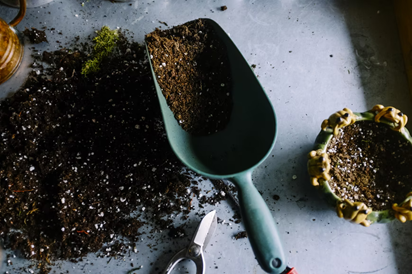
Have you already created your dream outdoor space with the help of our expert Sydney landscape designers? Your beautiful garden is full of unique plants that need to be cared for and maintained. One fantastic way to keep your plants healthy and happy is using good-quality compost. And the best part is, you can make it yourself!
The Best Way To Make Compost In Sydney
Making your own compost can bring considerable benefits to your garden and the environment. Because composting omits the use of chemicals, it aids in improving the overall health of your soil, making it far more resilient and productive. In addition, making compost yourself helps you save money and reduce waste while still maintaining lush, flourishing plants!
But what actually is compost? And how do you make it? In this article, we will answer these questions and more so you can get started making your compost today!
What is Compost?
Compost is made by recycling organic waste, allowing it to decompose and become a fertiliser rich in nutrients to help you grow healthy plants. All organic matter eventually decays, but the composting method accelerates this natural process. Organisms such as fungi and bacteria help this organic waste decompose, resulting in nutritious garden soil that your plants will love!
Choosing the Right Compost Bin
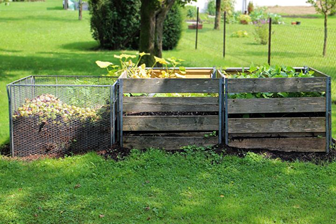
Choosing the correct style of a compost bin for you is a vital step in making your compost.
The bin you choose will vary greatly depending on several factors, such as how much space you have, what type of organic waste you will be using, and the quantity of waste you think you will have.
There are a range of different bins to suit how much time and effort you want to put into making your compost. For example, tumbler compost bins make it more convenient to turn your compost. Hot composting bins promote higher temperatures and a speedier compost-making process. This kind of bin is beneficial if you are short on time and want composting soil ready as soon as possible!
The size and material of the bin you choose will depend on the size of your garden and how much organic waste you think you will have to fill it with. If you have ample outdoor space or expect to have a lot of organic waste, purchasing a larger bin, such as a wooden one, could work for you. If you have less space in your yard or do not produce much organic waste, it may be best to opt for a smaller compost bin. Plastic compost bins are often smaller in size and well-suited for small spaces.
Preparing Your Compost Bin
To prepare the garden for your compost bin, you will need an appropriately sized space of earth or soil on which you can place the container directly. If you do not have any bare ground available, you can put the compost bin on top of a hard surface, but make sure to add a layer of soil on top.
An essential step in preparing your compost bin is ensuring proper drainage. You can easily do this by adding in some leaves, cut grass, or other woodland waste. This allows insects such as worms to enter the compost bin.
Pest Control
A common problem with compost bins is that the smell of decaying food can attract unwelcome visitors, such as mice and rats!
You can avoid these pests from appearing by mixing your compost regularly and adding layers of grass cuttings or torn-up paper. This helps reduce the smell and keep your compost pile healthy and well-balanced.
Most pests like to build nests in warm, dry places. By keeping the compost pile moist, you can prevent these creatures from making their homes in your bin!
Compost Ingredients
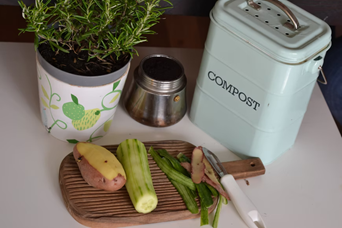
Now your bin is ready, you can start choosing the ingredients for your compost!
It is a good idea to vary the ingredients you add to create the best compost mix. Compost bins contain a huge variety of different decomposing organisms that require both carbon and nitrogen to work well.
Nitrogen can be found in organic household waste such as vegetable peels, grass cuttings, or leftover coffee grinds. Ingredients that provide carbon include dead leaves, waste paper, and twigs. Therefore, using a mix of both these green and brown waste materials will help to keep the organisms in your bin alive and allow them to break down all these ingredients into usable compost.
Compost Care
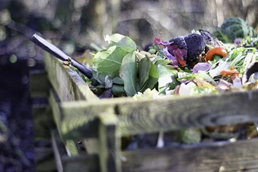
In addition to choosing the correct ingredients for your compost, there are a few other ways you can help the process along.
The organisms that decompose the waste in your bin also need water and oxygen to survive. To ensure that your compost has enough oxygen, you can layer different materials so that it maintains a good flow of air. Turning your compost regularly can also help with aeration.
Compost also needs to sustain a delicate balance between wet and dry. If it is slimy and wet, it may contain too much nitrogen. To remedy this, you can add more brown waste material.
If the compost feels very dry, it is likely carbon-heavy. To add moisture, you can add a layer of nitrogen-rich green waste material, such as food scraps.
Using Your Compost
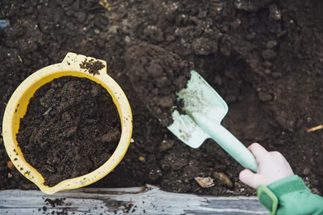
How long your compost takes to be ready will depend on the size of your bin, how much waste you put in, and what kind of ingredients you use. Some compost can be prepared in a few months, while others take a year or more. You will need some patience while you wait! But keep caring for your compost, and soon, those recycled waste materials will turn into nutrient-rich soil that you can use on your plants!
You can then use it to pot new plants, add mulch to flowerbeds, or fertilise older ones. Have fun making your compost!
For further assistance in designing and maintaining your ideal garden, contact our top-quality Sydney landscape solutions team!
